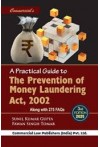- Author(s): Sunil Kumar Gupta, Pawan Singh Tomar
- Publisher: Commercial Law Publishers (India) Pvt Ltd
- Edition: 3 Ed 2025
- ISBN 13 9789356036925
- Approx. Pages 588 + Contents
- Format Paperback
- Approx. Product Size 24 x 16 cms
- Delivery Time 3-5 working days (within Kerala & South India) (Others 7-9 days)
- Shipping Charge Extra (see Shopping Cart)
..................................................................................................................................
Description
In most of the countries, the illicit money earned through drug trafficking activities is really huge and mind boggling. A major part of these proceeds are utilised to finance terror activities, which is a burning issue for many developed, underdeveloped or third- world countries. These drug trafficking activities and terrorist threats/actions have cross border implications. In view of global pressure and the political declaration the global programme for action was adopted by the General Assembly of the United Nations (UN) in its seventeenth special session in February 1990. The UN Security Council in its resolution dated 29 July 2005 called upon the members (States) to implement the International Standards relating to 40 recommendations on money-laundering and 9 special recommendations on terrorist financing. All these recommendations are the creation of Financial Action Task Force (FATF), which is the main institution in the world to counter the money-laundering activities by making specific recommendations. India is also one of the members of FATF. These recommendations on the subject are revised at times and the same have been adopted by more than 130 countries of the world.
The Prevention of Money Laundering Bill, 1998, was introduced in Parliament in August 1998. It was followed by the revised Bill, 1999 which finally resulted in the enactment of the Prevention of Money Laundering Act, 2002. It ultimately came into force w.e.f. 1-7-2005. Its main object is to prevent money-laundering and to confiscate the property derived from or involved in money-laundering and to prosecute the offenders, who commit the offence of money-laundering.
There are certain offences listed in the 'Schedule' of Prevention of Money Laundering Act, 2002. Initially in Part ‘A' of the Schedule, there were only two offences under the IPC, 1860 and nine offences under NDPS Act, 1985. However, with the Amendment Act of 2012, almost all the Part 'B' offences were shifted into Part 'A' of the Schedule (Offences under 26 Acts) together with many more offences under the IPC, 1860.
When a scheduled offence is committed, the proceeds of crimes emanating from the scheduled offence are liable for confiscation. Usually the proceeds of the crimes are subjected to multiple financial transactions with the aim to divorce/distance it from its original source. After all these financial operations, the illicit money is introduced/integrated in the economy, as if it is licit money. The persons who are in any manner involved with dealing in the proceeds of crimes (like possession, conversion, concealment, projecting it as untainted money, etc.) are liable to be proceeded against as per the provisions of Prevention of Money Laundering Act, 2002.
In India, apart from drug trafficking activities and terrorist (activities) financing, there are other equally important crimes, which have been included in the Schedule. Some of these offences are relating to corruption by public servants (Prevention of Corruption Act), criminal conspiracy, corporate frauds, frauds related to insider trading, offences under the Information Technology Act, etc.
..................................................................................................................................
Contents
Chapter 1. Preliminary
Chapter 2. Offence of Money - Laundering
Chapter 3. Attachment, Adjudication and Confiscation
Chapter 4. Obligations of Banking Companies, Financial Instiitutions and Intermediaries
Chapter 5. Summons, Searchers and Seizures Etc.
Chapter 6. Appellate Tribunal
Chapter 7. Special Courts
Chapter 8. Authorities
Chapter 9. Reciprocal Arrangement for Assistance in Certain Matters and Procedure for Attachment and
Confiscation of Property
Chapter 10. Miscellaneous
Chapter 11. Suggestions
..................................................................................................................................
Author Details
Sunil Kumar Gupta is the Founder Chairman of SARC Associates and a
Fellow Member of the Institute of Chartered Accountants of India
(ICAI). He holds a Post Qualification Diploma in Information Systems
Audit (DISA) and is a certified Forensic Auditor holding "Forensic
Accounting & Fraud Detection" (FAFD) certificate and a certificate
in "Arti Money Laundering Laws", issued by ICAL
He is also the Life
Member of the Indian Council of Arbitration (ICA) and on the Panel of
Arbitrators maintained by ICA and ICAI and Member of the Institute of
Certified Public Accountants of Uganda (CPA-U). He is the co-founder of
multinational business forums like Indo European Business Forum (IEBF).
With over 37 years of experience in fields of Corporate Financing,
Taxation, Banking, Education, Investment, Development and project
implementations, he has also been a part of numerous international
delegations and has participated in a number of international
conferences.
Pawan Singh Tomar is a retired IRS Officer, who
worked as Pr. Commissioner of Income Tax at Karnal, Panchkula and Delhi.
He had the flair to work in the investigation wing and has been one of
the most efficient and experienced officers. He has been also known in
the department for his honesty, soft skills, pragmatic approach and
motivating his juniors.
He held diverse assignments in the Income Tax
Department and has also worked as under Secretary in the Ministry.
Amongst other assignments, he worked for 6 years in Investigation wing
(Delhi), 4 years in Directorate of Vigilance, 5 years as Zonal Director,
Narcotics Control Bureau Ahmadabad and 4 years as Additional
Commissioner in M.C.D
He joined State Bank of Travancore and SBI as
PO followed by his association with the MP. Government as Dy. Collector
in the year 1985.

